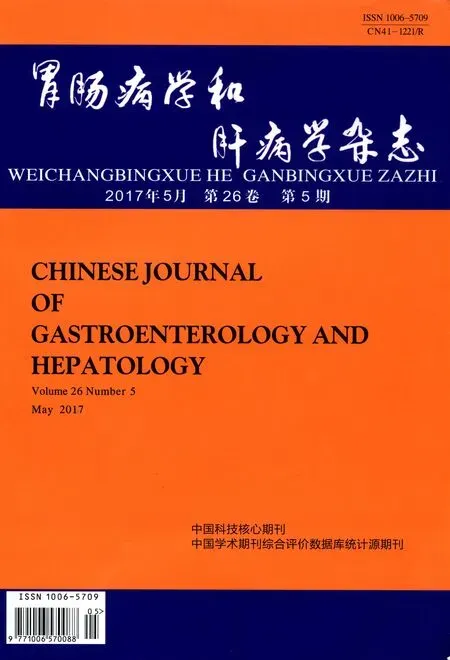睡眠障碍对功能性消化不良的影响
康婷婷,刘纯伦
重庆医科大学附属第一医院消化内科,重庆 400016
睡眠障碍对功能性消化不良的影响
康婷婷,刘纯伦
重庆医科大学附属第一医院消化内科,重庆 400016
睡眠障碍对功能性消化不良有一定的影响,其机制尚不明确,可能与胃肠动力、脑肠肽、内脏高敏感性及精神心理因素等相关。对于伴睡眠障碍的功能性消化不良患者,常规治疗联合抗焦虑或抑郁治疗/心理干预可能是有益的。
功能性消化不良;睡眠障碍;胃肠动力;脑肠肽;内脏高敏感性
功能性消化不良(function dyspepsia, FD)是一种常见的功能性胃肠病,其全球发病率为5%~11%[1]。FD患者中的睡眠障碍发生率明显高于健康人[2-4],且睡眠质量的高低与FD患者症状的严重程度呈正相关。我国成年人出现睡眠障碍的比例高达30%,睡眠障碍可增加胃肠道症状(上腹痛、上腹不适、恶心等)的发生率[5],甚至导致功能性胃肠道疾病,如FD。因此,睡眠障碍对FD的影响日益受到重视。
FD发病机制尚不明确,可能与胃肠动力障碍、脑肠肽分泌异常、内脏高敏感性、精神心理因素等多种因素相关[6-7];近年来睡眠障碍对FD的影响机制及其治疗方面取得较大进展,本文就此作一概述。
1 睡眠障碍与FD的相关性
1.1 睡眠障碍与胃肠道动力 有研究发现睡眠障碍伴FD患者其睡眠各期胃肌电中频及振幅较FD患者及健康志愿者降低;而另一项研究发现睡眠质量差的人胃肌电节律紊乱的发生率显著高于睡眠质量好的人,在饮水后21~30 min睡眠质量差的人与睡眠质量好的人相比,其中频明显减少,高频增加,低频无显著性差异[8];动物实验研究结果显示:对其实行睡眠剥夺不仅可造成支配胃肠运动的神经中枢(孤束核及迷走神经背运动核)细胞放电呈现先增加后下降的变化,还可造成胃肌电活动呈现初始增加后逐渐抑制直至紊乱的状态,但其频率和波幅均无规律可循[9]。理论上胃电节律异常可导致胃平滑肌收缩节律紊乱、胃排空延迟,甚至引起FD症状,目前尚不清楚睡眠障碍引起的胃平滑肌电节律的异常,能否导致胃平滑肌收缩节律、胃排空、胃动力的异常以及消化不良症状,有待临床研究予以明确。
1.2 睡眠障碍与脑肠肽 脑肠肽是双重分布于胃肠道和神经系统的肽类物质,它可直接调节胃肠道的感觉和运动,控制食欲,调节摄入量,并参与中枢神经系统调节胃肠道功能,可能参与了FD的发病机制。近年来研究提示睡眠障碍可能也与部分脑肠肽相关。促生长素具有调节食欲、促进摄食、加强胃排空的作用,研究发现长期失眠患者与健康人相比夜间促生长素水平明显下降[10],增加促生长素的水平可以改善FD患者的早饱、餐后饱胀等症状[11]。研究发现睡眠不足会降低瘦素水平,改善睡眠后可使瘦素水平恢复正常[12],增加快速动眼睡眠(rapid eye movement sleep, REM)可降低瘦素水平[13],这些研究提示睡眠障碍可能导致瘦素的异常分泌,而FD患者症状也与瘦素密切相关,其症状改善后其瘦素水平明显增加[14]。褪黑素的分泌具有昼夜规律,凌晨2~3点达到高峰,后逐渐减少,有研究发现与健康人相比,睡眠障碍患者其24 h褪黑素分泌量虽无显著性差异,但可推迟褪黑素的分泌[15],在夜间给FD患者口服褪黑素可明显改善其上腹痛症状[16],以上研究提示睡眠障碍可能通过影响褪黑素的分泌规律导致FD症状的发生,褪黑素既是一种直接的自由基清除剂,又是一种间接的抗氧化剂,对胃肠黏膜有保护作用。有研究发现睡眠质量差的儿童晨起皮质醇水平明显升高,提示睡眠障碍可能增强下丘脑-垂体-肾上腺(hypothalamic-pituitary-adrenal axis, HPA)轴活性,而HPA轴兴奋可导致胃肠道小血管痉挛使胃黏膜坏死及增加机体对外源性应激因子的易感性。脑肠肽是脑-肠轴靶向作用的分子基础,能够连接和调控脑-肠轴交互作用的各个环节,直接参与胃肠道的运动及感觉,其水平的紊乱最终可导致FD的发生。目前研究提示促生长素、瘦素、褪黑素等脑肠肽与睡眠障碍相关,而脑肠肽分泌的异常是FD的重要发病机制之一,这也间接提示了睡眠障碍可能是通过影响脑肠肽的异常分泌导致FD的发生或加重,其具体机制有待进一步研究。
1.3 睡眠障碍与内脏高敏感性 FD患者的内脏高敏感性主要表现为胃肠道对化学性刺激或机械性扩张的阈值降低,导致患者产生早饱、餐后饱胀或上腹痛等症状。研究发现睡眠障碍也可能降低疼痛阈值,使患者对生理性或伤害性刺激感知为过敏体验。有研究[17]显示睡眠剥夺不仅对冷热觉过敏,也对机械性的刺激产生痛觉过敏,其机制可能为睡眠中断影响下行镇痛通路,其研究结果从另一个角度提示伴有睡眠障碍的FD患者可能具有较高的内脏敏感性。动物实验结果显示睡眠剥夺可明显降低疼痛阈值导致痛觉过敏,并增加一氧化氮合成酶及其信号通路的活动[18]。一氧化氮作为胃肠道的一种抑制性神经递质,有研究发现在餐后不适综合征患者中其十二指肠球部的一氧化氮合成酶表达明显强于正常对照组,而FD患者十二指肠球部一氧化氮合成酶的表达也与FD患者上腹胀症状呈正相关[19],由此推测一氧化氮合成酶的异常表达可能是睡眠障碍引起FD患者餐后饱胀的机制之一。
1.4 睡眠障碍与精神心理因素 精神心理因素既与睡眠障碍相关,也与FD的发生有关。匹兹堡睡眠质量指数(Pittsburgh sleep quality index,PSQI)是国际上常用的睡眠质量参数,得分愈高者表示其睡眠质量愈差。研究显示在FD患者中PSQI得分与抑郁量表评分呈显著正相关[2-3],而FD伴睡眠障碍患者其焦虑抑郁的发病率也明显高于无睡眠障碍者[20],提示FD患者可能存在与睡眠障碍相关的心理疾病或精神心理因素相关的睡眠障碍。临床研究资料表明睡眠障碍与负面情绪显著相关[21-22],可导致焦虑抑郁的发生。而睡眠障碍影响心理疾病的发生可能与以下几个方面有关:(1)功能性磁共振成像显示睡眠障碍可增加大脑对情绪刺激的活动,放大对情绪的反应[23];(2)睡眠障碍存在REM的异常,而从REM觉醒可增加焦虑抑郁患者对负面刺激的评价[24];(3)睡眠不足可影响情感中枢的编码,特别是对积极情感记忆的编码,而缺乏对负面情感记忆的编码,即睡眠障碍患者可能会选择性记住产生负面情绪的经历,而对积极情绪的经历却容易忘记;(4)睡眠不足可能会降低心理阈值对压力的感知[25]。睡眠障碍对FD的影响是否也与上述机制相关,尚不明确。
2 伴睡眠障碍的FD患者的治疗
大部分FD患者在常规的促动力药、抑酸药及抗幽门螺杆菌治疗后可取得较好的疗效;但越来越多的证据表明在伴睡眠障碍的FD患者中,给予抗焦虑抑郁治疗及心理干预可能是有益的。
2.1 抗焦虑抑郁治疗 三环类抗抑郁药不仅具有抗焦虑抑郁的作用,还具有镇静催眠的作用,其可降低REM,而此期与胃酸的产生相关,所以此类抗抑郁药物对FD伴有睡眠障碍、焦虑抑郁的患者较为适用。阿米替林作为临床上常用的三环类抗抑郁药,研究显示其比安慰剂更能改善FD患者的症状[26],而多虑平作为传统的抗抑郁药,可阻断M胆碱受体,减少胃酸的分泌,降低胃平滑肌收缩的幅度及频率,减轻FD患者的症状,氟哌噻吨美利曲辛片作为一种新型的三环类抗焦虑、抑郁药,在减轻消化道症状的同时也降低情绪反应[27],改善睡眠障碍。也有研究发现文拉法辛可明显改善FD伴睡眠障碍患者的临床症状,文拉法辛可抑制5-羟色胺(5-hydroxytryptamine, 5-HT)的再摄取,而5-HT作为一种脑肠神经递质,不仅与情感障碍相关,还与胃肠动力及胃肠内脏高敏感性密切相关。近年来研究结果显示抗焦虑抑郁治疗对部分FD患者是有益的,但具体治疗方案还有待进一步探索。
2.2 心理干预 在伴睡眠障碍的FD患者治疗中,除一般药物治疗,联合心理干预,如认知行为疗法、放松疗法、催眠疗法等可减少患者对睡眠问题的过度关注,提高睡眠质量,降低焦虑抑郁的发生,减轻其对FD患者症状的影响。研究发现,与单纯药物治疗组相比,联合心理治疗,不仅可明显减少患者的消化系统症状,还可以明显改善患者的精神状态[28],从而可降低FD的复发率,提高患者的生活质量,同时也避免了医疗资源的严重浪费。而另一项随机对照试验结果也显示,在标准药物治疗的基础上联合心理治疗,可提高症状反复发作的FD患者的治疗效果[29],这提示心理干预在部分伴睡眠障碍FD患者的治疗中是必要的,因此探索多学科联合治疗模式是伴有睡眠障碍FD治疗研究的方向。
3 展望
综上所述,睡眠障碍对FD有一定的影响,其机制尚未明确,可能与睡眠障碍影响胃肠动力、脑肠肽分泌、内脏高敏感性和精神心理等多种因素相关,未来可能需要多学科联合深入探讨FD与睡眠障碍之间的关系,不但有助于FD和睡眠障碍诊治水平的提高,也将有助于加深对FD和睡眠障碍发病机制的认识。
[1]Ford AC, Marwaha A, Sood R, et al. Global prevalence of, and risk factors for, uninvestigated dyspepsia: a meta-analysis [J]. Gut, 2015, 64(7): 1049-1057.
[2]Lacy BE, Everhart K, Crowell MD. Functional dyspepsia is associated with sleep disorders [J]. Clin Gastroenterol Hepatol, 2011, 9(5): 410-414.
[3]Futagami S, Yamawaki H, Izumi N, et al. Impact of sleep disorders in Japanese patients with functional dyspepsia (FD): nizatidine improves clinical symptoms, gastric emptying and sleep disorders in FD patients [J]. J Gastroenterol Hepatol, 2013, 28(8): 1314-1320.
[4]Yamawaki H, Futagami S, Shimpuku M, et al. Impact of sleep disorders, quality of life and gastric emptying in distinct subtypes of functional dyspepsia in Japan [J]. J Neurogastroenterol Motil, 2013, 20(1): 104-112.
[5]Cremonini F, Camilleri M, Zinsmeister AR, et al. Sleep disturbances are linked to both upper and lower gastrointestinal symptoms in the general population [J]. Neurogastroenterol Motil, 2009, 21(2): 128-135.
[6]Miwa H, Ghoshal UC, Fock KM, et al. Asian consensus report on functional dyspepsia [J]. J Gastroenterol Hepatol, 2012, 27(4): 626-641.
[7]Chen Y, Wang C, Wang J, et al. Association of psychological characteristics and functional dyspepsia treatment outcome: acase-control study [J]. Gastroenterol Res Pract, 2016, 2016: 5984273.
[8]Chen CL, Lin HH. Gastric dysrhythmias and transient sleep impairment in healthy subjects [J]. Dig Dis Sci, 2004, 49(2): 176-179.
[9]黄裕新, 王景杰, 秦明, 等. 睡眠剥夺对大鼠胃运动及其神经中枢的影响 [J]. 胃肠病学和肝病学杂志, 2005, 14(2): 114-116. Huang YX, Wang JJ, Qin M, et al. The effects of sleep deprivation on gastric motility and it’s nerve centre in rats [J]. Chin J Gastroenterol Hepatol, 2005, 14(2): 114-116.
[10]Motivala SJ, Tomiyama AJ, Ziegler M, et al. Nocturnal levels of ghrelin and leptin and sleep in chronic insomnia [J]. Psychoneuroendocrinology, 2009, 34(4): 540-545.
[11]Yamawaki H, Futagami S, Kawagoe T, et al. Improvement of meal-related symptoms and epigastric pain in patients with functional dyspepsia treated with acotiamide was associated with acylated ghrelin levels in Japan[J]. Neurogastroenterol Motil, 2016, 28(7):1037-1047.
[12]Mullington JM, Chan JL, Van Dongen HP, et al. Sleep loss reduces diurnal rhythm amplitude of leptin in healthy men [J]. J Neuroendocrinol, 2003, 15(9): 851-854.
[13] Olson CA, Hamilton NA, Somers VK. Percentage of REM sleep is associated with overnight change in leptin [J]. J Sleep Res, 2016, 25(4): 419-425.
[14]Xiao M, Qiu X, Yue D, et al. Influence of hippophae rhamnoides on two appetite factors, gastric emptying and metabolic parameters, in children with functional dyspepsia [J]. Hell J Nucl Med, 2012, 16(1): 38-43.
[15]Shibui K, Uchiyama M, Kim K, et al. Melatonin, cortisol and thyroid-stimulating hormone rhythms are delayed in patients with delayed sleep phase syndrome[J]. Sleep Biol Rhythms, 2003, 1(3): 209-214.
[16]Klupinska G, Poplawski T, Drzewoski J, et al. Therapeutic effect of melatonin in patients with functional dyspepsia[J]. J Clin Gastroenterol, 2007, 41(3): 270-274.
[17]Schuh-Hofer S, Wodarski R, Pfau DB, et al. One night of total sleep deprivation promotes a state of generalized hyperalgesia: a surrogate pain model to study the relationship of insomnia and pain [J]. Pain, 2013, 154(9): 1613-1621.
[18]Damasceno F, Skinner GO, Araújo PC, et al. Nitric oxide modulates the hyperalgesic response to mechanical noxious stimuli in sleep-deprived rats [J]. BMC Neurosci, 2013, 14(1): 92.
[19]Yuan HP, Li XP, Yang WR, et al. Inducible Nitric Oxide Synthase in the duodenal mucosa is associated with mast cell degranulation in patients with functional dyspepsia [J]. Ann Clin Lab Sci, 2015, 45(5): 522-527.
[20]古巧燕, 张军. 功能性消化不良伴睡眠障碍患者的临床特征[J]. 胃肠病学, 2015, 20(7): 417-420. Gu QY, Zhang J. Clinical characteristics of functional dyspepsia patients with sleep disorder [J]. Chin J Gastroenterol, 2015, 20(7): 417-420.
[21]Talbot LS, McGlinchey EL, Kaplan KA, et al. Sleep deprivation in adolescents and adults: changes in affect [J]. Emotion, 2010, 10(6): 831-841.
[22]Paterson JL, Dorrian J, Ferguson SA, et al. Changes in structural aspects of mood during 39-66h of sleep loss using matched controls [J]. Appl Ergon, 2011, 42(2): 196-201.
[23]Gujar N, Yoo SS, Hu P, et al. Sleep deprivation amplifies reactivity of brain reward networks, biasing the appraisal of positive emotional experiences [J]. J Neurosci, 2011, 31(12): 4466-4474.
[24]McNamara P, Auerbach S, Johnson P, et al. Impact of REM sleep on distortions of self-concept, mood and memory in depressed/anxious participants [J]. J Affect Disord, 2010, 122(3): 198-207.
[25]Minkel JD, Banks S, Htaik O, et al. Sleep deprivation and stressors: evidence for elevated negative affect in response to mild stressors when sleep deprived [J]. Emotion, 2012, 12(5): 1015-1020.
[26]Braak B, Klooker TK, Wouters MM, et al. Randomised clinical trial: the effects of amitriptyline on drinking capacity and symptoms in patients with functional dyspepsia, a double-blind placebo-controlled study [J]. Aliment Pharmacol Ther, 2011, 34(6): 638-648.
[27]Yan XJ, Li WT, Chen X, et al. Effect of clinician-patient communication on compliance with flupentixol-melitracen in functional dyspepsia patients [J]. World J Gastroenterol, 2015, 21(15): 4652-4659.
[28]Faramarzi M, Azadfallah P, Book HE, et al. A randomized controlled trial of brief psychoanalytic psychotherapy in patients with functional dyspepsia [J]. Asian J Psychiatr, 2013, 6(3): 228-234.
[29]Orive M, Barrio I, Orive VM, et al. A randomized controlled trial of a 10week group psychotherapeutic treatment added to standard medical treatment in patients with functional dyspepsia [J]. J Psychosom Res, 2015, 78(6): 563-568.
(责任编辑:陈香宇)
The effects of sleep disorders on functional dyspepsia
KANG Tingting, LIU Chunlun
Department of Gastroenterology, the First Affiliated Hospital of Chongqing Medical University, Chongqing 400016, China
Sleep disorders have certain effects on functional dyspepsia (FD), the mechanism has not been fully understood, which may be related to gastrointestinal motility, brain-gut peptide, visceral high sensitivity and mental psychological factors. FD patients with sleep disorders may benefit from the combination of empiric therapy and anti-anxiety/anti-depression treatment, psychological intervention.
Functional dyspepsia; Sleep disorders; Gastrointestinal motility; Brain-gut peptide; Visceral high sensitivity
10.3969/j.issn.1006-5709.2017.05.002
专题·功能性胃肠病
康婷婷,硕士研究生,住院医师,研究方向:功能性消化不良。E-mail:531841998@qq.com
刘纯伦,博士,主任医师,研究方向:功能性胃肠病。E-mail:lcl728@medmail.com
R57
A
1006-5709(2017)05-0484-03
2016-02-07

